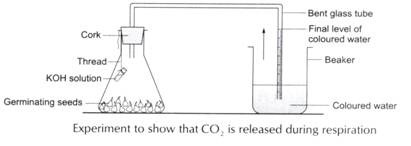Read this Experiment to Show Carbon Dioxide is Released During Respiration!
Experiment:
Objective:
To show experimentally that carbon dioxide is released during respiration.
Apparatus and Materials Required:
A conical flask, a beaker, a cork with a hole, a glass tube bent at right angles at two places, a small test tube, KOH solution, thread, coloured water.
Vaseline and germinating seeds of gram or pea.
Theory:
Respiration is a catabolic process which involves the breakdown of food or complex organic molecules into simpler products, with the release of energy. This process can take place either in the presence of oxygen (aerobic respiration) or in its absence (anaerobic respiration).
The overall reaction mechanism of aerobic respiration involves the oxidation of carbohydrate and the subsequent production of CO2, H2O and energy.
C6H12O6+6O2 → 6CO2 + 6H2O + Energy
Procedure:
1. Take the conical flask and place some germinating gram or pea seeds in it.
2. Insert the shorter end of the glass tube through the hole in the cork and fix it on the conical flask.
3. Before fixing the cork, hang a test tube containing KOH solution inside the conical flask with the help of a thread.
4. Take coloured water in the beaker and keep the longer end of the glass tube dipped inside it.
5. Make the conical flask airtight by applying Vaseline on its rim.
6. Note the initial level of water in the tube.
7. Observe and note the rise in the water level after an hour, without disturbing the apparatus.
Observations:
Water level rises up in the bent tube.
Result:
The rise in the level of water indicates that CO2 is produced by germinating seeds during respiration. Actually, the germinating seeds respire and produce CO2, which is absorbed by KOH solution. This creates a vacuum in the conical flask. The air present in the bent glass tube moves into the conical flask. This pulls the water in the bent tube further up.
Precautions:
1. Keep the conical flask airtight.
2. Fix the shorter end of the glass tube in such a way that it does not touch the seeds.
3. Use freshly prepared KOH solution.
